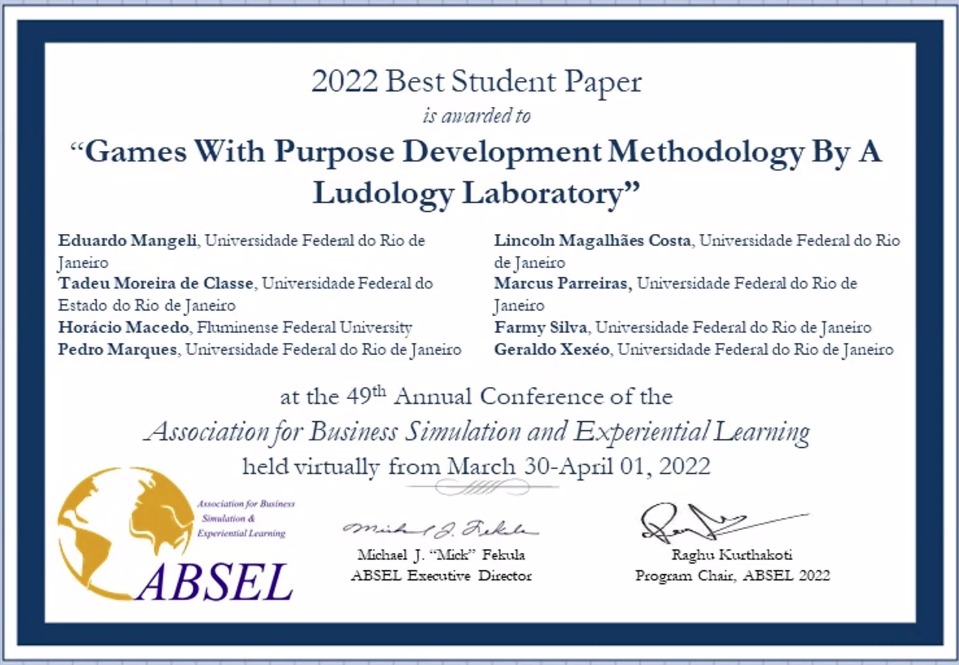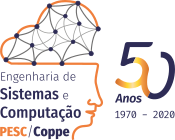LUDES wins the Best Student Paper at ABSEL-2022
LUDES won the “Best Student Paper” award at the ABSEL-2022 conference with the article “Games with a Purpose Development Methodology By a Ludology Laboratory”, written by Eduardo Mangeli (M.Sc. and PhD student/PESC), Tadeu Moreira de Classe (D.Sc. and professor /UniRio), Horácio Macedo (BCC-UFRJ/Master student at UFF), Pedro Marques (graduate student at UFRJ), Lincoln Magalhães da Costa (ES-UFPR/PhD student PESC), Marcus Parreiras (Master-CEFET/Doctoral student CFSP) and Farmy Silva (CFSP Master/Doctoral candidate) and Geraldo Xexéo (CFSP professor). Click here.
“The Association for Business Simulation and Experiential Learning (ABSEL) is an organization for academics and practitioners who develop and promote innovative and effective teaching methods in the disciplines of business, management and related fields.” (from the ABSEL website)
The article describes the result of several years' work at LUDES, being a collaborative construction that organized and registered the way of working for the development of purposeful games, those that are created with a purpose other than entertainment. With this process, we created several games, such as the recent Screener, board, and the Treasure Map, digital.
Also nominated for the same award was the article “On the Design of Educational Course of Action Wargaming”, by doctoral student Leandro Ouriques (Brazilian Navy), post-doc Carlos Eduardo Barbosa (Brazilian Navy) and professor Geraldo Xexéo, all from PESC. Click here.
Congratulations to all authors!

Below are the abstracts of the articles.
Games with a Purpose Develpment Methodology By a Ludology Laboratory
Abstract
This article presents the formalization of the methodology used by members of a Ludology Laboratory to develop games with purpose. The methodology consists of a five-step process: Conception, Project, Development, Evaluation, and Packaging, and also by the tools and practices used during the execution of its tasks. It was defined by considering experiences of lab members while creating ludic artifacts, other works that also propose processes for this very same end, the study of documentation created during game development within the laboratory, and the logs of these processes. Three examples of the usage of this methodology are shown. This work hopes to contribute to developing new methodologies for designing serious games, which have greater dynamism and collaboration between those involved, whether they are researchers, programmers, artists, or game designers.
On the Design of Educational Course of Action Wargaming
Abstract
The Joint Planning Process is a document that describes the guidelines to employ the Brazilian Armed Forces. The military can also apply these guidelines for educational purposes, to train their staff in times of peace. The Brazilian Ministry of Defense intends to simulate the employment of military forces to speed up the decision-making cycle and increase the chances of operational success. Consequently, actions would be better planned and risks would be better assessed. The Course of Action (COA) Wargaming simulates each friendly COA against the possible enemy COAs. However, the doctrinal process lacks information to describe how to conduct a COA Wargame. Therefore, doctrinal knowledge is limited to systematizing this analysis. COA Wargaming has been subjective and has relied on tacit knowledge. This work aims to propose a method to conduct the COA Wargaming, and a conceptual model to structure the COA Wargaming, enabling the further use of computer systems to support its conduction. Wargames’ concepts inspire this game design. Wargames are defined as models or simulations of conflicts in a synthetic environment, involving opposing forces, in which players make decisions based on rules, procedures, and information. Improving COA Wargaming as an educational wargame tool would simulate military planning, support players to build effective strategies, support instructors to analyze players’ decisions and umpire engagements, and build a technological framework to collect decision data for future applications in knowledge management and artificial intelligence.



